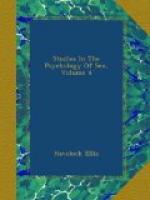In the typical cases just mentioned, all fairly normal and healthy women, the sexual effects of music though definite were usually quite slight. In neuropathic subjects they may occasionally be more pronounced. Thus, a medical correspondent has communicated to me the case of a married lady with one child, a refined, very beautiful, but highly neurotic, woman, married to a man with whom she has nothing in common. Her tastes lie in the direction of music; she is a splendid pianist, and her highly trained voice would have made a fortune. She confesses to strong sexual feelings and does not understand why intercourse never affords what she knows she wants. But the hearing of beautiful music, or at times the excitement of her own singing, will sometimes cause intense orgasm.
Vaschide and Vurpas, who emphasize the sexually stimulating effects of music, only bring forward one case in any detail, and it is doubtless significant that this case is a woman. “While listening to a piece of music X changes expression, her eyes become bright, the features are accentuated, a smile begins to form, an expression of pleasure appears, the body becomes more erect, there is a general muscular hypertonicity. X tells us that as she listens to the music she experiences sensations very like those of normal intercourse. The difference chiefly concerns the local genital apparatus, for there is no flow of vaginal mucus. On the psychic side the resemblance is marked.” (Vaschide and Vurpas, “Du Coefficient Sexual de l’Impulsion Musicale,” Archives de Neurologie, May, 1904.)
It is sometimes said, or implied, that a woman (or a man) sings better under the influence of sexual emotion. The writer of an article already quoted, on “Woman in her Psychological Relations” (Journal of Psychological Medicine, 1851), mentions that “a young lady remarkable for her musical and poetical talents naively remarked to a friend who complimented her upon her singing: ’I never sing half so well as when I’ve had a love-fit.’” And George Eliot says. “There is no feeling, perhaps, except the extremes of fear and grief, that does not make a man sing or play the better.” While, however, it may be admitted that some degree of general emotional exaltation may exercise a favorable influence on the singing voice, it is difficult to believe that definite physical excitement at or immediately before the exercise of the voice can, as a rule, have anything but a deleterious effect on its quality. It is recognized that tenors (whose voices resemble those of women more than basses, who are not called upon to be so careful in this respect) should observe rules of sexual hygiene; and menstruation frequently has a definite influence in impairing the voice (H. Ellis, Man and Woman, fourth edition, p. 290). As the neighborhood of menstruation is also the period when sexual excitement is most likely to be felt, we have here a further indication that sexual emotion




